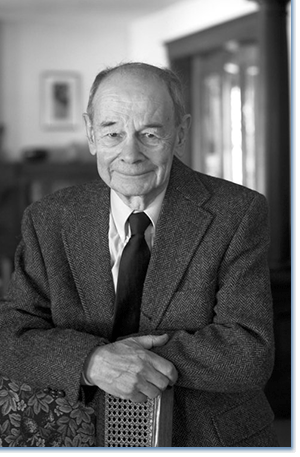Edmund Morgan (Edmund Morgan)

Morgan was the second child of Edmund Morris Morgan and Elsie Smith Morgan. His mother had been raised in a New England family that practiced Christian Science, though she distanced herself from the faith. His father, descended from Welsh coal miners, taught law at the University of Minnesota. His sister was Roberta Mary Morgan, better known by her married name of Roberta Wohlstetter. In 1925, the Morgan family moved from Washington, D.C. to Arlington, Massachusetts when Morgan senior began teaching at Harvard Law School.
Morgan’s interest in history grew while he attended Belmont Hill School outside of Boston, and while he was an undergraduate at Harvard. He went on to earn his Ph.D. in the History of American Civilization there in 1942, studying under Perry Miller. He began his teaching career at the University of Chicago (1945–46) and then at Brown University (1946–55) before becoming a professor at Yale, where he directed many PhD dissertations in colonial history. During this same period, in 1948, Morgan’s law-professor father chaired the committee that drafted the first Uniform Code of Military Justice for U.S. armed forces. He has written many books covering a range of topics in the history of the colonial and Revolutionary periods, using intellectual, social, biographical and political history approaches. Two of his early books, Birth of the Republic (1956) and The Puritan Dilemma (1958), have for decades been required reading in many undergraduate history courses. Reviewer Alfred Kelly praised The Birth of the Republic and emphasized its distinctively “Whiggish” flavor that upheld the Patriot position. Kelly concludes the book is, “highly convincing defense of a rather conservative and traditional historical treatment of the Revolutionary era.” Morgan said the Patriots were largely united in defense of their traditional rights. He thus rejected both the Imperial school (which upheld the British position on taxes), and the Progressive School (typified by Charles Beard and Merrill Jensen) that stressed economic and class divisions among the Americans.
Later works include American Slavery, American Freedom (1975), which won the Society of American Historians’ Francis Parkman Prize, the Southern Historical Association’s Charles S. Sydnor Prize and the American Historical Association’s Albert J. Beveridge Award, and Inventing the People: The Rise of Popular Sovereignty in England and America (1988), which won Columbia University’s Bancroft Prize in American History in 1989. He has also written biographies of Ezra Stiles, Roger Williams, and Benjamin Franklin. Morgan in 1975 argued that Virginians in the 1650s—and for the next two centuries—turned to slavery and a racial divide as an alternative to class conflict. “Racism made it possible for white Virginians to develop a devotion to the equality that English republicans had declared to be the soul of liberty.” That is, white men became politically much more equal than was possible without a population of low-status slaves.
He died in New Haven, Connecticut, on July 8, 2013, at the age of 97. His first wife, Helen Theresa (Mayer) Morgan, whom he had married in 1939, had died in 1982. He is survived by two daughters, from his first marriage, Penelope Aubin and Pamela Packard; his second wife, the former Marie Caskey, a historian; six grandchildren; and seven great-grandchildren.
In 1971 he was awarded the Yale Chapter of Phi Beta Kappa’s William Clyde DeVane Medal for outstanding teaching and scholarship, considered one of the most prestigious teaching prizes for Yale faculty. In 1971–1972 Morgan served as president of the Organization of American Historians. In 1972, he became the first recipient of the Douglass Adair Memorial Award for scholarship in early American history, and in 1986 he received the Distinguished Scholar Award of the American Historical Association. He has also won numerous fellowships and garnered a number of honorary degrees and named lectureships. He became a Sterling Professor, one of Yale’s highest distinctions, in 1965. Morgan was awarded the 2000 National Humanities Medal by U.S. President Bill Clinton for “extraordinary contributions to American cultural life and thought.” In 2006, he won a special Pulitzer Prize citing “a creative and deeply influential body of work as an American historian that spans the last half century.”
Born
- January, 17, 1916
- USA
- Minneapolis, Minnesota
Died
- July, 08, 2013
- USA
- New Haven, Connecticut


